Discover Oxford Policy Pod
Oxford Policy Pod

Oxford Policy Pod
Author: Students at the Blavatnik School of Government, Oxford University
Subscribed: 132Played: 941Subscribe
Share
© Copyright 2026 Students at the Blavatnik School of Government, Oxford University
Description
A bi-weekly policy podcast based out of the Blavatnik School of Government at the University of Oxford. The Oxford Policy Pod explores pressing policy issues around the globe and is produced by students reading for a Master of Public Policy at the Blavatnik School of Government.
The podcast explores contemporary policy challenges that policymakers face all over the world, and taps into the rich diversity of policy experience and insights of the student body and faculty.
The podcast is supported by the staff of the Blavatnik School of Government.
Disclaimer: The views and opinions expressed in this podcast are those of the students, speakers and featured guests only. They do not represent the views or position of featured organisations, or the Blavatnik School of Government and the University of Oxford.
To keep up with the latest on our episodes, follow us on Instagram @OxfordPolicyPod_ and Twitter @OxfordPolicyPod.
The podcast explores contemporary policy challenges that policymakers face all over the world, and taps into the rich diversity of policy experience and insights of the student body and faculty.
The podcast is supported by the staff of the Blavatnik School of Government.
Disclaimer: The views and opinions expressed in this podcast are those of the students, speakers and featured guests only. They do not represent the views or position of featured organisations, or the Blavatnik School of Government and the University of Oxford.
To keep up with the latest on our episodes, follow us on Instagram @OxfordPolicyPod_ and Twitter @OxfordPolicyPod.
116 Episodes
Reverse
In this episode, Sri Mulyani Indrawati, Indonesia’s former Minister of Finance, joins Oxford Master’s students Marc Naro and Diego Peñaranda for a conversation on leadership, crisis management, and the strategy behind Indonesia’s economic rise.From navigating global financial shocks to strengthening fiscal discipline and driving long-term growth, she reflects on the hard decisions that shape a nation’s future.Recorded at the Blavatnik School of Government, University of Oxford.
On the Oxford Policy Pod, Blavatnik School of Government students Marc Naro and Meredith Lehman sit down with Stefan Dercon, Professor of Economic Policy at the University of Oxford. Dercon is also the author of Gambling on Development: Why Some Countries Win and Others Lose. Drawing on insights from his last book, Gambling on Development: Why Some Countries Win and Others Lose, the discussion explores how countries mobilise resources for growth, the political foundations of successful development strategies, the evolving role of multilateral institutions, and the challenges facing international economic cooperation in an increasingly fragmented world. Recorded at the Blavatnik School of Government, University of Oxford.
In this episode, Marc Naro and Cristian Iftodii host Professor Paul Krugman about the future of Europe, American politics, and China's growth. Paul Krugman is an economist and college professor. In 2008, he won the Nobel Prize for his research on international trade and economic geography. Paul was a New York Times opinion writer from 2000 to 2024 and is now active on Substack.
Abhishek Singh is the CEO of the IndiaAI Mission and Additional Secretary at the Ministry of Electronics and Information Technology (MeitY), Government of India. A veteran of the 1995 Indian Administrative Services (IAS) batch and an alumnus of IIT Kanpur and Harvard Kennedy School, he has spearheaded some of the world’s largest digital transformations, including DigiLocker, the COVID-19 vaccination platform (CoWIN), and the Bhashini language interface.In this episode, Mr Singh speaks with Avinash Kothuri about India’s unique approach to AI, contrasting it with the regulatory models of the EU and the innovation-led model of the US. He details why India is moving the global AI discourse beyond the "Safety" focus of early summits toward an agenda of "Impact", focusing on the three pillars of People, Planet, and Progress ahead of the landmark 2026 AI Impact Summit.The conversation dives into the importance of infrastructure for all and shared compute, India’s green energy advantage for data centres, and the risks of becoming solely dependent on Western models. Mr Singh also argues for a global governance framework that prioritises responsible use over restrictive development.Grounded in 30 years of experience as a problem solver in the civil service, Mr Singh offers a roadmap for how the Global Majority countries can leverage AI for social empowerment—from agriculture advisories to healthcare access—while ensuring the benefits are democratised across diverse communities.
Emiliana Vegas is one of Latin America’s leading voices in education policy. Originally from Venezuela, she studied at Harvard and went on to senior roles at the World Bank and the Inter-American Development Bank, where—as Division Chief of Education—she managed a portfolio of over $3B a year in grants and loans. In this conversation, she reflects on what it really takes to move from evidence to systems change inside international development organisations. In this episode, Bautista Fazio discusses her new book, Let’s Change the World, and the practical lessons she draws for people working in or with multilaterals: why evidence must travel with values; how autonomy and judgment at the task-team level shape outcomes; the cultural and governance differences between the World Bank and the IDB; and what “cross-regional learning” looks like in practice. Emiliana walks through the Chile reform episode on quality assurance, the importance of co-creation with governments, and her personal “70/30 rule” for knowing when it’s time to seek a new challenge. We also reflected upon Latin America’s education journey in recent years — from the expansion of access to the enduring challenge of learning — and the opportunities that lie ahead.
Jana Bischler is the focal point for social protection and climate change at the International Labour Organization (ILO), where she works with governments worldwide to design systems that protect people from climate shocks and support long-term resilience. From a career in development consulting to shaping global social protection policy, Jana brings both on-the-ground insight and international perspective. In this episode, Jana explains how cash transfers, pensions, health insurance, and adaptive social protection programs can break the cycle of climate-driven vulnerability, protecting children, older people, informal workers, and whole communities before, during, and after disasters. Drawing on examples from Kenya, Brazil, the Philippines, China, Côte d’Ivoire, and the United States, she shows how countries with different systems can prepare, expand coverage, and respond quickly to floods, droughts, and heatwaves. The conversation also tackles financing and governance challenges from coverage gaps and debt burdens to the role of the new loss-and-damage fund while exploring how national adaptation plans and COP negotiations can bring social protection to the centre of climate action. Jana highlights why stronger coordination between environment and social ministries is key, and how growing public demand for climate action opens a window for universal, climate-ready social protection. Grounded in global evidence and practical country cases, this episode offers a clear roadmap for building resilient, inclusive social protection systems that safeguard lives and livelihoods in an era of worsening climate change.
Vinod Karate is Project Director for State Reform at the Central Square Foundation where he helps drive India’s landmark NIPUN Bharat Mission to ensure every child can read, write, and count by age ten. From an early career in investment banking to shaping one of the world’s largest foundational learning reforms, Vinod’s journey bridges sharp strategy with deep community engagement. In this episode, Vinod shares how India is rethinking the very foundations of schooling and how CSF partners with states to design and scale reforms that align with India’s NIPUN Bharat goals. He unpacks CSF’s three-phase approach to state reform: strengthening teacher capacity, redesigning governance around learning outcomes, and building political and administrative coalitions, which helps make large-scale change possible. Drawing on his experience in Uttar Pradesh, Madhya Pradesh, and Haryana, Vinod illustrates how reform really takes root on the ground. He explains how structured pedagogy, sustained teacher mentoring, and real-time data and assessment can translate policy into daily classroom practice, and how seizing windows of political alignment, unlocking budgets, and shifting decision-making from state capitals to districts ensures that change is owned and sustained at the local level. Grounded in evidence, this episode offers a clear, actionable roadmap for strengthening foundational learning and creating education systems that sustain reform and deliver lasting results for every child.
From community-led forest conservation in Odisha to negotiating at the United Nations, Archana Soreng embodies how lived experience can reshape global climate policy. An Indigenous climate leader from India’s Kharia tribe, Archana served on the UN Secretary-General’s Youth Advisory Group on Climate Change (2020–2023), is a Skoll World Forum Fellow (2024), and sits on The Rockefeller Foundation’s Climate Advisory Council. She works at the intersection of Indigenous knowledge, youth leadership, and climate governance, advocating for policies that honour land rights, protect biodiversity, and include those most affected in decision-making. In this episode, Archana shares how her community’s traditions of forest conservation and sustainable living shaped her vision for climate justice. She explains why free, prior and informed consent and genuine participation are essential, and how poorly designed mitigation like ill-planned plantations or large solar projects can harm adaptation and livelihoods. Drawing on her experience from village gatherings to UN climate negotiations, she reflects on overcoming tokenistic representation, breaking barriers to climate finance for youth and Indigenous groups, and the importance of mental well-being in long struggles for environmental justice. From safeguarding culture and language to influencing national climate commitments, Archana offers a grounded, hopeful blueprint for policymakers, funders, and young leaders working toward an inclusive and sustainable climate future.
"Something's Brewing" is a laid-back podcast hosted by MPP student Wynsey, where conversations flow freely-just like the drinks. In each episode, a member of the Blavatnik School community joins over a favourite beverage from home to share personal stories, career reflections, and the life that happens beyond policy. In this episode, Wynsey chats with Julia, an MPP student from Uganda, about the “why” that drives her. From overcoming challenges in accessing education to finding her voice as a young advocate, Julia speaks candidly about the experiences that shaped her journey. With honesty and heart, she reflects on her childhood, her path into advocacy, and the making of the strong woman she is today.
Possible Utopia is the podcast exploring the intersection of politics, gender, and leadership to imagine a more inclusive future.In this episode, we speak with Vanessa Nakate, Ugandan climate activist, founder of the Rise Up movement, and author of A Bigger Picture. She shares her journey from launching Fridays for Future in Uganda to amplifying African voices in the fight for climate justice.We discuss her leadership, the challenges of being a young woman in the public eye, how she addresses online trolling, and her vision for the future of climate action.🎧 Tune in to hear what drives her, how she keeps community at the centre of her work, and whether politics might be part of her path ahead.
Possible Utopia is the podcast where we explore the intersection of politics, gender, and leadership to imagine a better world. From addressing challenges of safety and well-being in public life to uncovering the motivations that drive individuals, we look at the stories behind those shaping our societies. Together, we take on difficult questions, confront systemic barriers, and reimagine a more inclusive and just political landscape.This is not just a conversation about policy and gender; it is a journey toward possibility, a utopia we can begin building today. Let’s explore it togetherMeet our host of Possible Utopia, Kanksshi Agarwal, Founder of NETRI Foundation, India’s first incubator for women in politics, featured in LiveMint’s 100 Women Shaping India, TEDx speaker, and Cyril Shroff Scholar at University of Oxford.About the Episode with Kartik DesaiIn this episode, we welcome Kartikeya N. Desai, an investing and development finance expert and Founder of Desai & Associates.Kartik Desai, an impact investor at leading Indian funds and advisor to foundations and policymakers on blended and outcome finance, explains how capital can advance gender and climate goals.💡 The conversation includes examples from his work in gender-lens investing and outcome funding for women’s skilling, employment, and entrepreneurship, as well as blended finance facilities for women-led SMEs and efforts to overcome regulatory barriers driving systemic change in India.🎧 Listen now and discover how finance can be a force for good when applied the right way.
In this episode, MPP students Helen Orjuela and Ana Osorio explore one of the most pressing yet often overlooked public policy issues: careThey are joined by Diana Rodríguez Franco, Special Advisor on Gender and Diversity to the Inter-American Development Bank and former Secretary for Women in Bogotá, where she led the creation of the city’s internationally recognised Care System - Manzanas del Cuidado.Together, they unpack why care work, largely carried out by women, remains undervalued despite being essential to economic and social well-being. Drawing on Diana’s experience, the conversation explores how innovative public policies can address time poverty, redistribute unpaid care, and create more equitable societiesThis episode is a must-listen for anyone interested in gender equality, social protection, and the design of transformative policies.🎧 Tune in to understand why care is not just a private matter—it’s a public good, and a cornerstone for inclusive development.
Nikunj Agarwal is a public policy practitioner, an Oxford MPP alumna, and currently the Strategic Stakeholder Country Lead for the What Works Hub for Global Education at the British CouncilIn this episode, he reflects on bridging the gap between evidence and policymaking, the power of listening over telling, and what it takes to make education reform work in the real world.From cost-effective solutions to collaborative system change, Nikunj shares insights from classrooms, coalitions, and policy spaces across India.He also offers a simple, thoughtful framework for anyone exploring a career in public policy.
🌱Empowering Communities through Climate Justice🎙️In this episode, we are joined by Alexandra Gallo, a policymaker specialised in environmental justice and climate resilience. From working on California's Transformative Climate Communities programme to implementing the largest environmental justice grant in US history under the Inflation Reduction Act, Alexandra shares her journey and challenges. We unpack how truly community-driven governance can transform climate action, why representation matters, and what's at stake in the current political landscape💪🏽🌍🎧Listen now if you're interested in equity, climate policy, and the future of environmental justice.
In this episode, Madison Jennings, Glória Almeida da Silva and Famin Ahmed explore how race and ethnicity shape the experience of gender-based violence around the world.Together, they discuss the legal and systemic barriers women of color face, the narratives that silence survivors, and the grassroots and policy efforts pushing for justice. Drawing on their work in Australia, Brazil, and the U.S., the guests share personal reflections, policy insights, and bold visions for an anti-racist, decolonial approach to GBV prevention.🎧 Tune in for a powerful conversation on justice, resilience, and intersectional policymaking.
🎙️ Shaping the AI we want: A conversation with Gabriela RamosIn this episode of the Oxford Policy Pod, MPP students Melissa Muñoz (Dominican Republic) and Gloria Almeida (Brazil) sit down with Gabriela Ramos, Assistant Director-General for Social and Human Sciences at UNESCO and one of the world’s foremost voices in ethical artificial intelligenceTogether, they explore what it means to govern AI not just as a technological issue, but as a societal one—one that touches education, science, culture, communication, and human rights. Drawing from her leadership in creating UNESCO’s Recommendation on the Ethics of AI, Gabriela shares why inclusion must be at the center of the digital transition, and how Latin America is stepping forward in shaping a more just technological future.As a candidate to lead UNESCO, Gabriela reflects on institutional leadership in a time of rapid change, and makes a powerful case for compassionate governance and global cooperation. This conversation is as much about algorithms as it is about agency, equity, and imagination.Tune in for an honest, hopeful conversation on the future of AI, multilateralism, and public purpose.
"Something’s Brewing" is a laid-back podcast hosted by MPP student Wynsey, where conversations flow freely—just like the drinks. In each episode, a member of the Blavatnik School community joins over a favorite beverage from home to share personal stories, career reflections, and the life that happens beyond policy.In this episode, Wynsey sits down with Mamiko and Shinnosuke, two MPP students from Japan, who reflect on the trials and tribulations of their lives, as well as the lesser known formative personal experiences that shape the policymakers that they are today. They delve into deeply personal histories - from the profound impact of a cherished mentor whose memory they carry forward, to unique life experiences such as living on a remote island, working for a delivery company, and supporting a community's evacuation during a volcanic eruption. Mamiko and Shinnosuke reveal how unconventional detours and pathways were instrumental in their development as civil servants in Japan, ultimately bringing them together during a chance encounter that sparked a strong friendship. This episode offers a heartfelt exploration of resilience, the unexpected lessons found in diverse experiences, and the human stories that drive a commitment to public service.
This episode takes a step back from policy topics to dive into a pervasive phenomenon in public service work: constant busyness and burnout. Ronan Harrington, an international speaker, expert on burnout and resilience, and MPP alumnus, joins MPP student Nate for a conversation on why burnout is so pervasive in public service careers and what we can do about it.The conversation explores:• Why is overwhelmed and burnout a particular problem in public service?• What are the root psychological factors that lead to constant busyness and burnout?• Is overwhelm and exhaustion just necessary in high impact careers?• Can technology and AI save us?• What are practical strategies to manage overwhelm when we can’t control the demands placed on us?
Siviwe Gwarube is South Africa’s Minister of Basic Education and one of the country’s youngest-ever Cabinet members. A fierce advocate for gender equity, evidence-based policymaking, and the foundational right to education, she brings a new voice and vision to the continent’s education leadership. In this episode, hosted by MPP students María Turner and Bautista Fazio, Minister Gwarube reflects on her first year in office—what surprised her, what challenged her, and what guides her approach. She speaks candidly about the mental toll of public leadership, the power of authenticity, and why prioritising foundational learning is not just a pedagogical choice, but a political one. She lays out five pillars of her strategy: early childhood development, literacy, teacher training, infrastructure, and inclusion. From advocating for mother-tongue education to navigating South Africa’s political transition, this episode offers a powerful reflection on what it means to lead with purpose—and why the future of education starts with bold decisions today.
Carlos Scartascini is a global leader in behavioral economics and its real-world application to public policy. As Deputy Chief Economist and head of the Behavioral Economics Group at the Inter-American Development Bank, he’s led research and projects that use behavioral science to tackle everyday policy challenges—like boosting tax compliance, improving public health, and building trust in government.






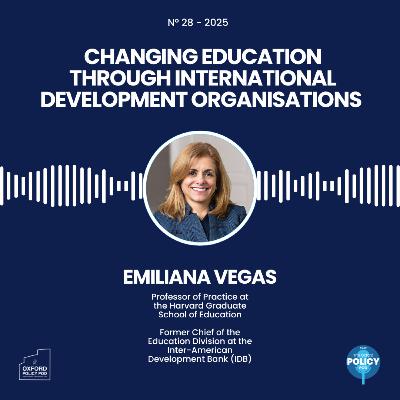
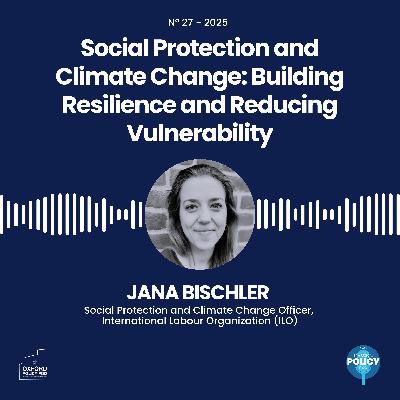


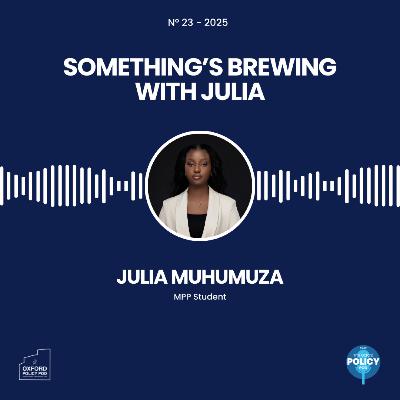


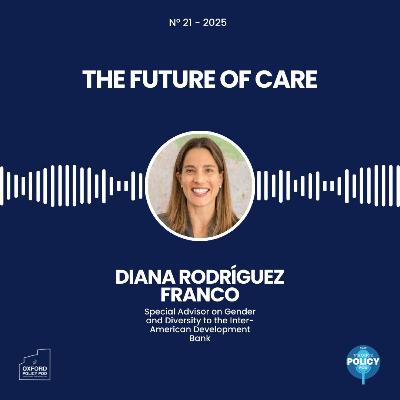
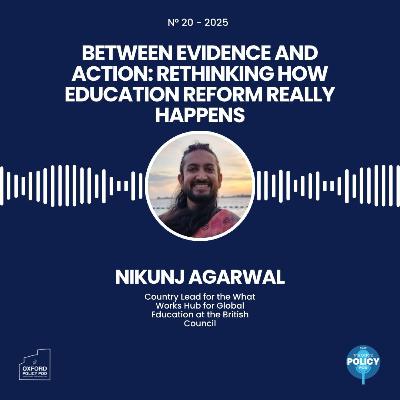
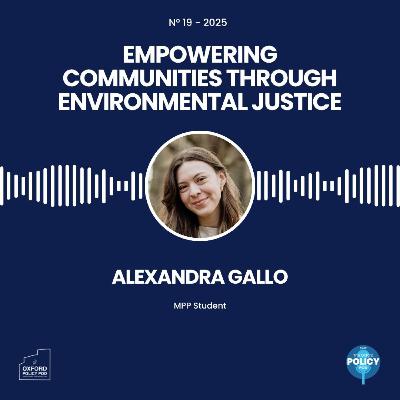



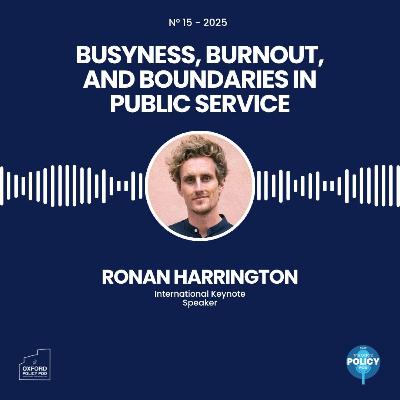
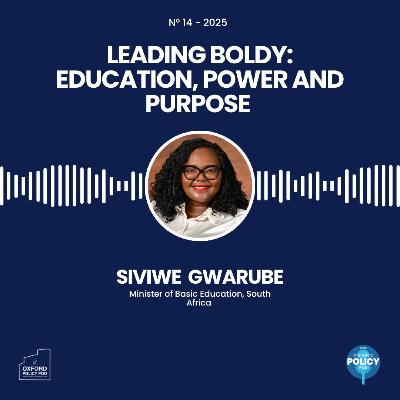
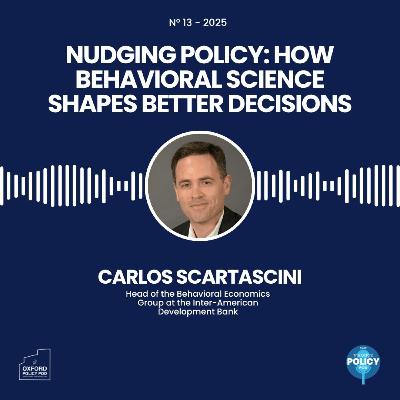



It’s called democracy